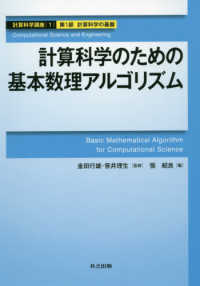- ホーム
- > 洋書
- > ドイツ書
- > Humanities, Arts & Music
- > Psychology
- > theoretical psychology
基本説明
Contents: Symbol system theory: the storage of knowledge by symbol systems - Knowledge is stored with homeomorphic spatial structures, not with proposition.
Description
(Text)
The use of mental imagery and mental models can make a substantial difference to language and thinking, which improve by using them. This happens because knowledge can only be stored in homeomorphic, spatial structures. Words are addresses that the brain uses to locate the simulacra it has stored. Accordingly, the traditional view of knowledge is untenable: knowledge is not stored in language-like propositions. The philosophical and mathematical arguments claiming propositions exist, are erroneous. Language is learned naturally when words, sentences and the structure of the situation are experienced simultaneously. Grammars are geometrical systems that cannot be expressed in words. Their diverse geometries result in different experiential and behavioural consequences for different languages.
(Table of content)
Contents: Symbol system theory: the storage of knowledge by symbol systems - Knowledge is stored with homeomorphic spatial structures, not with propositions.
(Author portrait)
The Author: Frode J. Strømnes is professor of cognitive psychology at the University of Bergen. He has done research on word learning and on the spatial structures of Finnish and Swedish.






